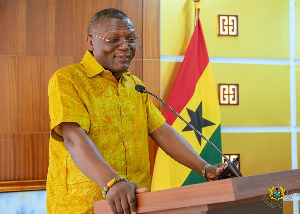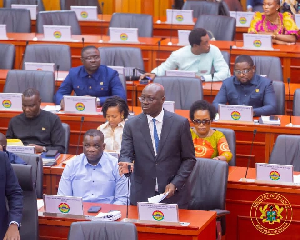Ghana’s president John Kufuor has announced a set of short-term interventions to lessen the full effects of the increases in electricity tariffs on the vulnerable in the society.
Consumers of electricity in the urban and rural areas whose consumption is between one to 50 units will now pay ?9,000 instead of the ?14,000 announced by the Public Utilities Regulatory Commission (PURC) last Monday.
The Ghanaian Government will pay the difference of ?5,000 as a subsidy directly to the Electricity Company of Ghana (ECG).
President Kufuor who was commissioning the Mallam Substation of the Volta River Authority (VRA) in Accra said his government will introduce a special programme for the supply of energy-saving bulbs which are 70 per cent the more efficient than normal bulbs for those who live in what is popularly known as “compound houses” to help cut down on their electricity consumption.
The power station was built a cost of 7.4 million and was financed by the VRA, ECG and the Swedish International Development Agency (SIDA). Kufuor said the government is to offer a package immediately to enable consumers to pay for such bulbs under a hire-purchase scheme.
The ministries of Energy and Works and Housing have been tasked to provide such technical and oversight mechanisms, which will ensure that the inefficiencies and corrupt practices of the utility suppliers are not passed on to the consumers.
“These are short-term measures that government is taking to ease the excessive burdens that will come on the low-income groups of the society,” the president said, adding, it is fair to mention that the new tariffs do not include any increase in the energy charges for industrial consumers.
Indeed, in the case of low voltage industrial consumers, the energy charge was reduced, even if slightly. The president however, explained that in order to encourage the efficient use of electricity by industry, the capacity charges were increased.
“It must be stressed that this portion of electricity bills for industry can, in fact, be controlled by the industrial consumers, through the installation of the appropriate equipment or through improved operational practices.”
For the medium and long-term, however, the government is actively engaged in finding definitive solutions to tackle the major bottlenecks of waste and heavy indebtedness and such other distortions within the economic management of the country.
“These have tended to paralyse all other wise serious efforts for the necessary economic take-off. And unless radical measures are adopted to tackle them, they will continue to frustrate us and force the economy to run on a stop-gap basis.”
Now that the Mallam plant has come on stream, Kufuor expressed the hope that the ECG and VRA would demonstrate that they can rise to the challenge of the proper management and maintenance of the plants, so they put to rest the unacceptable image of waste, inefficiency and disruptions that they have become notorious for.
The president expressed government’s gratitude to the Swedish International Development Agency (SIDA) for financing the project.












